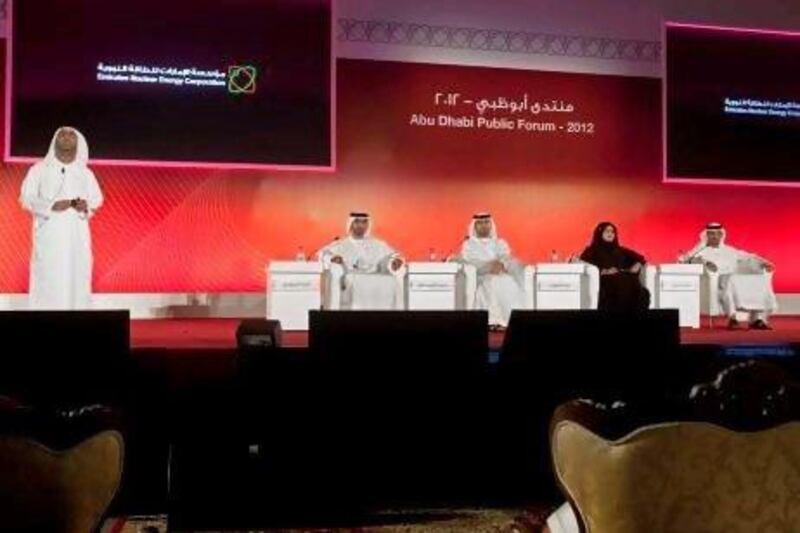ABU DHABI // Citizens raised two big questions at a public meeting to discuss the national nuclear energy programme yesterday: will we get jobs, and what happens to nuclear waste?
The 2012 Abu Dhabi Public Forum was hosted by the Emirates Nuclear Energy Corporation (Enec) at Abu Dhabi Police Officers Club to address the concerns of Emiratis about the country's four planned plants.
"We need 9 per cent more electricity each year, which is more than twice the world average," said Mohammed Al Hammadi, the chief executive of Enec.
"The plants will help to meet this need with safe, clean and reliable power for our nation's homes and businesses."
Jaafar Al Hashimi, the senior fuel engineer at Enec, gave the crowd of more than 500 an overview of how nuclear energy works.
Mr Al Hashimi also fielded questions on a wide range of topics, including uranium, radiation, and the efficiency, safety and environmental effects of nuclear energy.
"Are there safeguards to protect us if a nuclear leak takes place and the winds blow the radiation towards the urban areas?" asked Maj Gen Khalifa Hareb Al Khaili, the assistant undersecretary of the Ministry of Interior for resources and support services.
The panel responded that such safety issues had been researched exhaustively.
"The Government has conducted an extensive study to find the safest location," said Mr Al Hammadi. "The Braka site has been chosen after tests and simulations were conducted, taking into account the wind sweeps in the region, seismic activity and sea movements."
Several questions were also asked about nuclear waste.
"The UAE has placed as part of its principles no enrichment and no reprocessing will take place within the country," said Mr Al Hammadi.
"We have set our guidelines but we are also looking at other options … for example, France's nuclear material is reprocessed and used again."
Sheikha Al Qubaisi, from Al Gharbia, raised the question of recruitment from her area.
"Instead of recruiting from abroad and other emirates, why is there no support to people from in and around the Western Region?" she asked. "We have 200 students and graduates from the Higher Colleges of Technology who are awaiting employment."
Azzah Al Sharhan, the human resources director at Enec, said applications were open for graduates and students who wanted to be part of the nuclear programme.
"We are taking applications and we are looking for the best of the best to join us," Ms Al Sharhan said. "We currently have 170 students under our scholarships and we are looking for more."
Mr Al Hammadi added: "Nuclear energy is an emerging industry in the UAE, but one that will grow quickly as we expect to have more than 2,000 employees by 2020.
"That means that now is the time to apply for a chance to be a part of it right from the beginning.
"Retaining employees from areas close to the site is important to us because … this guarantees longevity with the corporation and in the nuclear field longevity is key."
Mr Al Hammadi said Enec was in talks with Adnoc to plan a city around the plant for the workers.
Ahmed Al Mazroui, the deputy chief nuclear officer, said living close to the plants held little risk.
"The risks of radiation from living near a nuclear plant or even in it are lower than the amount of radiation you get in a flight from Paris to New York," Mr Al Mazroui said.






